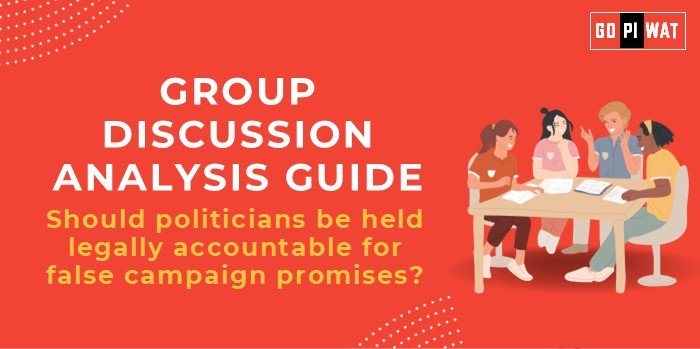📋 Group Discussion Analysis Guide: Should Politicians Be Held Legally Accountable for False Campaign Promises?
🌐 Introduction to the Topic
- 📖 Opening Context: Around the world, campaign promises shape elections, influencing voters’ decisions. However, unmet promises can erode trust in democracy.
- 💡 Topic Background: Historically, holding politicians accountable for their promises has been debated. While countries like New Zealand and the UK emphasize transparent political commitments, there’s little consensus on implementing legal frameworks for false promises.
📊 Quick Facts and Key Statistics
- 🌍 Global Voter Disillusionment: Over 60% of voters globally express distrust in political leaders, citing unmet campaign promises (World Values Survey, 2023).
- 📜 Accountability Models: Only 5 countries enforce campaign promise accountability to any extent, often through public tribunals.
- ⚖️ Litigation in India: Election-related litigation increased by 15% in 2023, with many cases rooted in campaign misrepresentations.
👥 Stakeholders and Their Roles
- 🏛️ Government Agencies: Oversee electoral processes and maintain transparency in campaigns.
- ⚖️ Judiciary: Enforce potential legal frameworks and address disputes.
- 🏢 Political Parties: Shape campaign narratives and implement manifestos.
- 🙋 Citizens: Demand accountability and participate in civic actions.
🏆 Achievements and Challenges
✨ Achievements:
- 📢 Increased Awareness: Campaign audits are improving transparency in countries like New Zealand.
- ⚖️ Judiciary Activism: In India, courts increasingly scrutinize campaign finance and false claims.
⚠️ Challenges:
- ❓ Subjectivity in Promises: Differentiating between strategic goals and outright lies remains ambiguous.
- 📉 Resource Constraints: Ensuring legal follow-ups for every broken promise can strain judicial systems.
🌍 Global Comparisons
- 🇳🇿 New Zealand: Introduced political advertising transparency laws in 2020.
- 🇧🇷 Brazil: Holds politicians accountable via fines for clear violations of manifesto commitments.
📚 Case Study: In 2023, a regional party in India was fined for unfulfilled economic promises, sparking debate on accountability mechanisms.
📄 Structured Arguments for Discussion
- 👍 Supporting Stance: “Enforcing legal accountability will enhance trust in democratic systems by ensuring leaders deliver on their commitments.”
- 👎 Opposing Stance: “Such measures may stifle political flexibility, as governance often requires adapting to changing realities.”
- ⚖️ Balanced Perspective: “While accountability is crucial, any legal measures must differentiate between intentional deceit and situational adjustments.”
💬 Effective Discussion Approaches
- 🎯 Opening Approaches:
- 📊 “Recent increases in voter litigation reflect a demand for political accountability.”
- 💡 “While democracy thrives on promises, their systematic failure threatens its credibility.”
- 🤝 Counter-Argument Handling:
- ✅ Highlight success stories of accountability (e.g., New Zealand).
- 💡 Suggest phased or limited implementation to avoid stifling governance flexibility.
🔎 Strategic Analysis of Strengths and Weaknesses
- 💪 Strengths: Enhances democratic accountability; empowers voters.
- ❌ Weaknesses: Risks judicial overload; subjective interpretation of promises.
- 🌟 Opportunities: Sets global precedents; integrates technology for transparency.
- ⚠️ Threats: Misuse of laws for political vendettas; erosion of governance adaptability.
🎓 Connecting with B-School Applications
- 🌍 Real-World Applications: Political accountability can inspire governance-related MBA projects.
- 📝 Sample Interview Questions:
- 💡 “What are the risks of introducing legal frameworks for political promises?”
- 🔍 “How could technology aid in monitoring political manifestos?”
- ✨ Insights for B-School Students:
- 📖 Understanding these dynamics enhances leadership and policy management skills.


